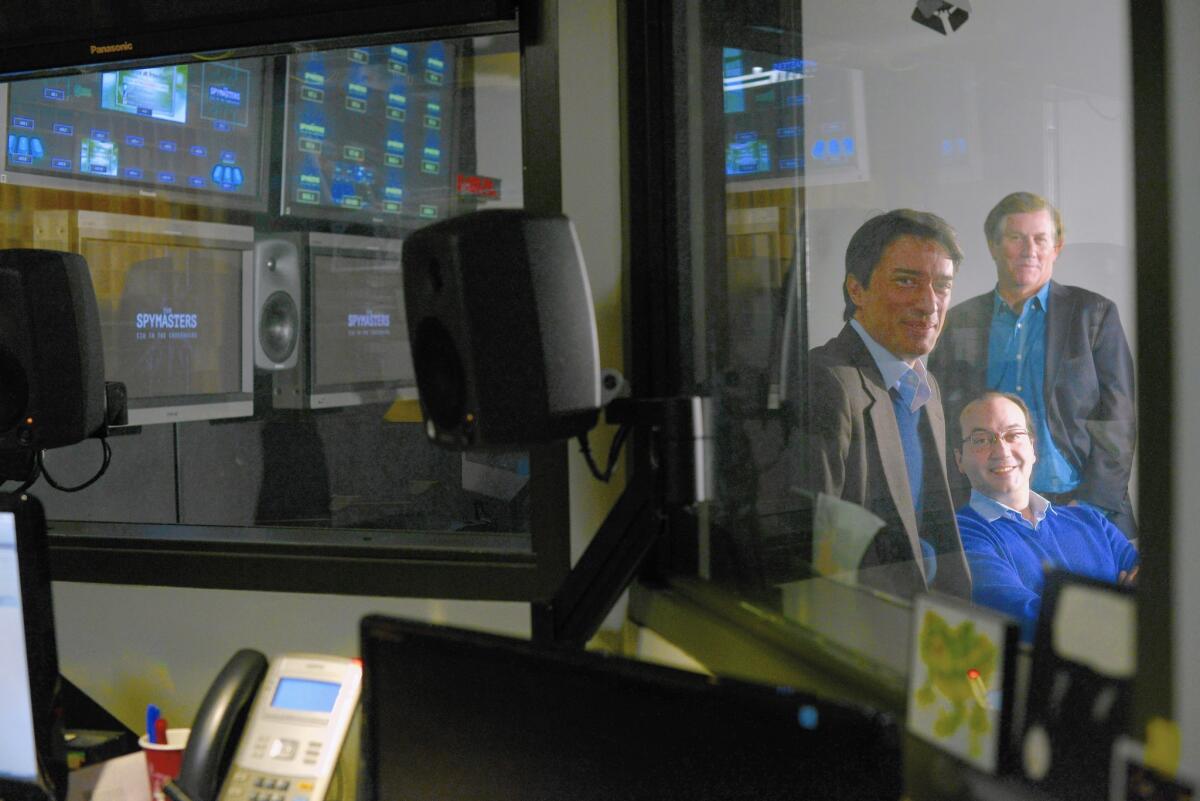How the makers of ‘The Spymasters’ got former CIA directors to open up

NEW YORK — In the opening act of the documentary “The Spymasters: CIA in the Crosshairs,” former Director Leon Panetta admits to authorizing a 2010 drone strike that killed an Al Qaeda member implicated in the deaths of seven CIA operatives.
“Those decisions are never easy,” Panetta says of approving the strike that resulted in unintended deaths, as he knew it might, “and frankly they shouldn’t be.”
The moral calculus of the CIA’s war on terror is the primary concern of “The Spymasters,” which premieres Saturday on Showtime. The film features candid interviews with all 12 living directors of the agency, from George H.W. Bush, who served under President Ford, through current head John Brennan.
SIGN UP for the free Essential Arts & Culture newsletter >>
“What we wanted this to be about was not just spies and covert action,” the film’s writer, Chris Whipple, said recently at the Upper East Side home of co-directors and brothers Jules and Gédéon Naudet. “We really wanted it to be about these 12 human beings.”
The questions raised by “The Spymasters” have heightened relevance following attacks attributed to Islamic State and other militant groups that have killed hundreds in Paris; Beirut; Bamako, Mali; and the Sinai Peninsula over the past month.
To its credit, the film doesn’t provide easy answers, instead revealing deep, continuing disagreements over such counterterrorism tactics as enhanced interrogation, drone warfare, black sites and the targeted killing of American combatants. It also sheds new light on the intelligence failures that led to the Iraq war and government inaction in the months before 9/11.
With a style and subject matter reminiscent of Errol Morris’ “Fog of War” or Dror Moreh’s “The Gatekeepers,” the project is “really about how far should we or should we not go to protect America,” said Jules Naudet.
The creative team most recently collaborated on “The Presidents’ Gatekeepers,” a Discovery Channel documentary about White House chiefs of staff, and clearly has a taste for interrogating the powerful and the secretive. “For documentary filmmakers, when you see a closed door, that is the biggest invitation,” explained Jules Naudet.
Of course, there are few institutions in American life with more closed doors than the CIA, which makes it impressive that Whipple and the Naudets were able to get all 12 living directors to participate in “The Spymasters.” But the filmmakers found that many were, if anything, eager for a chance to explain — and in some cases, unburden — themselves.
The most stubborn holdout was George Tenet, director of Central Intelligence from 1997 to 2004, who hadn’t given an interview in eight years. “Imagine that on your watch as CIA director you have 9/11, an enhanced interrogation program that a lot of people call torture, and you have [the faulty evidence for] weapons of mass destruction in Iraq,” said Whipple, a veteran news producer who began his career at “60 Minutes,” explaining Tenet’s reluctance.
“Tenet is a brilliant, fascinating, complicated guy and charismatic character, but he’s also a tortured soul. You can see how difficult it is for him still. I think he came to try to right his place in history.”
Most of the chiefs sat for two interviews, totaling as many as six or seven hours. Whipple, who was the primary interlocutor, read numerous memoirs and CIA histories and also tapped into the network of White House sources he’d established through “The Presidents’ Gatekeepers.” Preparation was key when it came to earning the respect of the film’s combative subjects, says Gédéon Naudet. “These guys are so used to bull... whoever is in front of them. The secret is research.”
Borrowing a technique pioneered by Errol Morris, Whipple conducted the interviews via a monitor placed over the camera, a method that allows the subject to look directly into the lens and creates a sense of intimacy. The filmmakers also draped the room in black, à la “Charlie Rose.”
The unusual setup raised some eyebrows, with at least one person likening it to something out of Guantanamo, but also yielded surprisingly frank admissions.
Take 91-year-old Stansfield Turner, director of Central Intelligence under President Jimmy Carter, who condemns enhanced interrogation — which he characterizes as torture — in the starkest terms. “I just think it’s beneath our dignity,” he says. “I think it’s poor for our reputation in the world.” In contrast, Tenet refuses to call the methods torture and says they helped uncover vital evidence — contradicting a report by the Senate Select Committee on Intelligence. Others, like Gen. Michael Hayden, are more critical of drone strikes, which he claims “feed the jihadi recruitment video” and the perception that “Americans are heartless killers.”
Despite the dissent among the directors, there is consensus on two subjects: the United States cannot “kill its way out” of the war on terror, and the fight will continue for generations to come. “That’s a pretty sobering thought,” said Jules Naudet.
“The Spymasters” is narrated by Mandy Patinkin, known for his role as tortured CIA officer Saul Berenson on the network’s hit spy drama “Homeland,” but the film features interviews with CIA operatives who make their fictional counterparts seem almost bland by comparison.
There’s Gina Bennett, a senior counterterrorism analyst in the unit assigned to Osama Bin Laden — and a mother of five — who contends that our willingness to “become something that we’re not” is a greater threat than terrorism itself; the swaggering Jose Rodriguez, who brushes off critics of the enhanced interrogation program he oversaw with a gruff “gimme me a break”; and Cofer Black, former director of the CIA’s counterterrorism center, who remains “pissed” that his urgent warnings before 9/11 went unheeded by national security advisor Condoleezza Rice.
As Whipple puts it, “Aaron Sorkin couldn’t have dreamed up these characters.”
The filmmakers delayed delivery in order to address the attacks in Paris that killed 130 people on Nov. 13.Though they’ve lived in New York for decades, the Naudets were born and raised in Paris and still retain their Gallic charm, sitting for an interview over coffee and fresh croissants. They recall the climate of fear that swept through the French capital in the mid-1980s, when Hezbollah bombed department stores, hotels and cinemas.
The brothers were also in Lower Manhattan on the morning of Sept. 11, 2001, making what was supposed to be a documentary about a rookie firefighter, but which became the Emmy-winning “9/11.” The film was broadcast on CBS six months after the attacks and featured harrowing footage from ground zero.
“It’s very strange, in a way, to see my two cities under attack,” said Jules Naudet. “But just like in New York after September 11 ... when something happens, we all put our heads together and try to heal.”
::
‘The Spymasters: CIA in the Crosshairs’
Where: Showtime
When: 9 p.m. Saturday
Rating: TV-MA-L (may be unsuitable for children under the age of 17, with an advisory for coarse language)
More to Read
The complete guide to home viewing
Get Screen Gab for everything about the TV shows and streaming movies everyone’s talking about.
You may occasionally receive promotional content from the Los Angeles Times.






